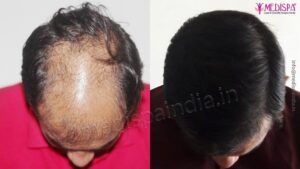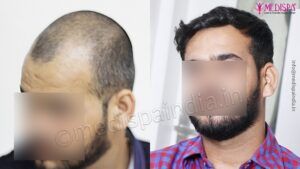
In contemporary society, numerous myths persist concerning various subjects, including diseases and cultural practices. Medical procedures are not exempt from these misconceptions, leading individuals to hesitate in making informed decisions about their options.
Currently, online platforms offer a significant advantage by providing access to a wealth of reliable information, provided it is sourced from reputable entities. With just a single click, one can dispel these myths and acquire factual knowledge.
Hair transplant procedures are relatively straightforward minor surgical interventions that involve relocating hair grafts from donor sites to the targeted areas of baldness. While the process may appear simple and uncomplicated, it actually requires meticulous planning and is more complex than it seems. Therefore, it is essential to select a qualified hair transplant surgeon to ensure the best outcomes.
Hair transplant in India has significantly advanced, and due to the expertise of several esteemed surgeons, the country has become a preferred destination for individuals experiencing hair loss from around the world, particularly for hair transplant tourism. The affordability of hair transplant cost in India has increased, as they are now widely accessible at numerous clinics nationwide, which are competing vigorously for patients.
Medispa Hair Transplant Clinic in Jaipur is recognized as a leading center for hair transplant procedures in India, drawing a substantial number of international patients. Our dedication to maintaining high international standards, along with state-of-the-art facilities, ensures optimal results for our clients. Under the leadership of Dr. Suneet Soni, a distinguished expert known for his remarkable artistic and surgical abilities, our team is committed to providing a comfortable and successful hair transplant experience. Dr. Soni also highlights the necessity of addressing prevalent myths about hair transplants that may prevent individuals from making well-informed choices. We aim to clarify these misconceptions to assist you in making the best decision for your hair restoration journey.
ESSENTIALS ABOUT HAIR TRANSPLANT
Hair transplant is a widely recognized procedure that generally does not require extensive explanation. However, various misconceptions surrounding the process continue to exist. It is important to examine some fundamental aspects of this technique.
A hair transplant is a minimally invasive surgical intervention designed to restore hair in areas affected by hair loss. This is accomplished by harvesting hair follicles or grafts from a donor site on the body and transferring them to the balding areas.
Understanding the long-lasting nature of this procedure is essential. What contributes to this durability? The hair that is transplanted is intended to last a lifetime. This is due to the fact that certain hair follicles are resistant to DHT (dihydrotestosterone), while others are not. The follicles that resist DHT lack receptors for androgenic hormones, which protects them from hormonal changes. The genetic characteristics of hair are determined by the root and remain consistent with the root’s properties, regardless of the location to which they are transplanted. Therefore, when these robust hair follicles are relocated to the designated areas, they yield permanent results.
You may be considering whether a hair transplant is the appropriate option for you. It is essential to recognize that a hair transplant is an elective procedure, granting you the freedom to choose when to proceed based on your personal readiness. However, it is equally vital to confirm that the procedure aligns with your individual circumstances. Not everyone experiencing hair loss is a suitable candidate for this treatment, making a thorough evaluation necessary to determine your eligibility. If you are genuinely facing hair loss, it is advisable to seek a consultation without delay. This will enable you to identify the root cause of your hair loss and develop an effective treatment strategy. A significant factor in assessing your candidacy is the availability of sufficient hair density in the donor area, which is crucial for successfully obtaining hair grafts to address the balding areas. Consequently, it is highly recommended to consult with a qualified professional before making any decisions regarding a hair transplant.
Myths associated with the hair transplant procedure
It is essential to clarify some misconceptions that have long been associated with the hair transplant industry and to understand the facts, enabling you to effectively plan your hair transplant procedure.
Myth #1: Hair transplants are exclusively for men.
Fact: While it is a common belief that only men can receive hair transplant surgery, this procedure is actually suitable for individuals of any gender. Hair transplants in women are less common than in men, largely due to the fact that women experience hair loss differently and less frequently. Instead of complete baldness, women typically exhibit patterns of thinning at the crown and widening of the part. The complexity of these cases often leads many less experienced hair transplant surgeons to avoid performing procedures on female patients.
Myth #2: Hair transplants can restore lost hair.
Fact: Many individuals mistakenly perceive hair transplantation as a method for hair regeneration and expect it to stimulate new hair growth. In reality, a hair transplant is a therapeutic procedure that relocates hair follicles from areas of the scalp that are genetically programmed to retain hair to regions that are bald. It does not contribute to the regeneration of lost hair follicles, and no technology has been developed to achieve this.
Myth #3: Hair transplants yield immediate results.
Fact: Numerous patients experiencing hair loss approach us with the hope of seeing rapid hair growth following a hair transplant. However, the results are not immediately visible, as the newly transplanted hairs undergo the same growth cycle as natural hair. Typically, noticeable hair growth can be observed approximately six months’ post-procedure, with full results becoming evident within a year.
Myth #4: Hair transplants are painful procedures.
Fact: Many individuals hesitate to undergo hair transplants due to the common misconception that surgical procedures are inherently painful. However, with the administration of local anaesthesia, the hair transplant process is largely devoid of pain. When performed by experienced professionals, the procedure is both comfortable and painless.
Myth #5: There is a specific age limit for hair transplant surgery.
Fact: It is a common misconception that hair transplantation is restricted to certain age groups and that it may pose risks for younger individuals. In reality, there is no specific age requirement for this procedure. As long as the individual has experienced consistent hair loss for a minimum of three years and exhibits no significant scalp issues, hair transplant surgery can be performed at any age.







